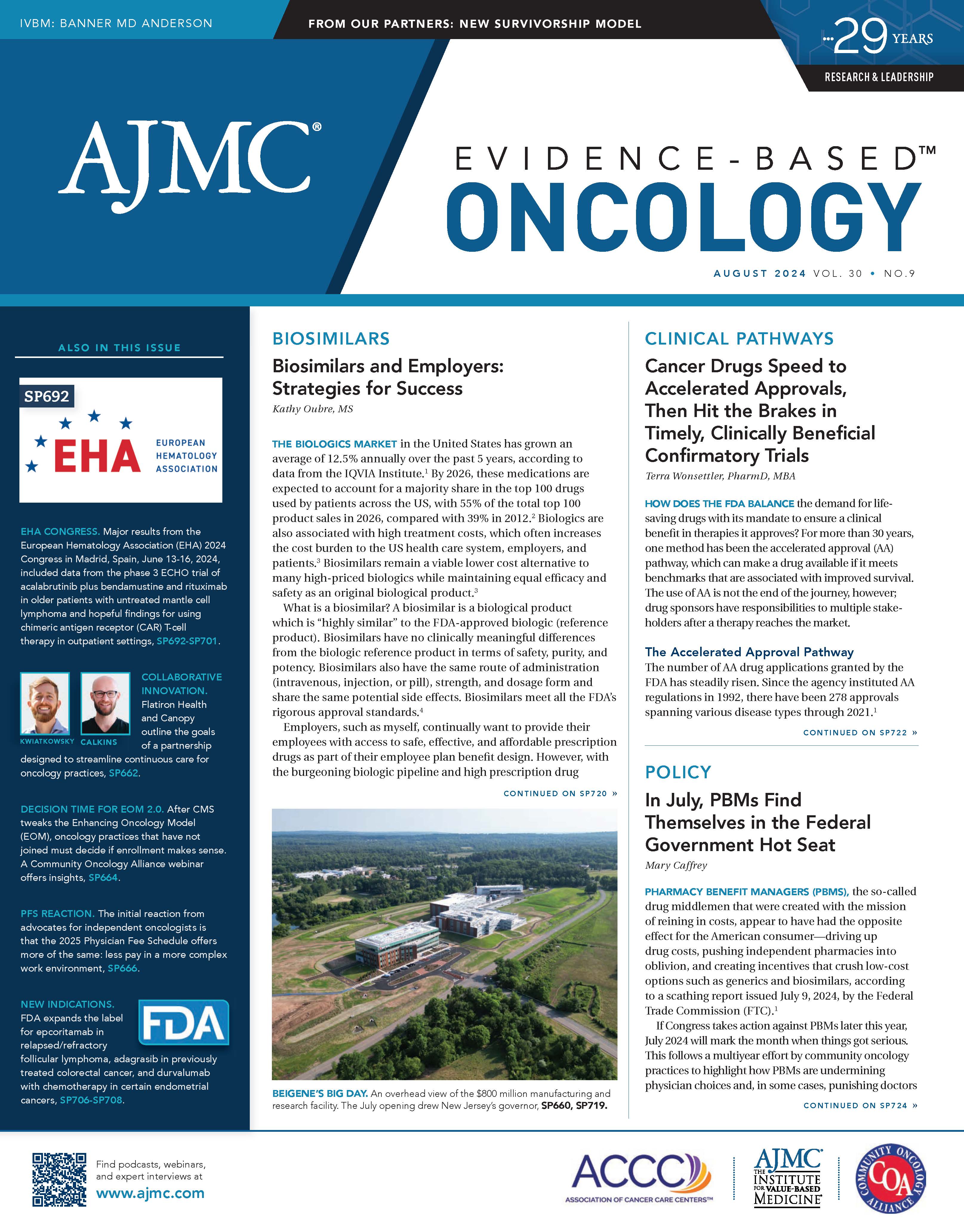- Center on Health Equity & Access
- Clinical
- Health Care Cost
- Health Care Delivery
- Insurance
- Policy
- Technology
- Value-Based Care
Payment Cuts for Independent Oncologists Would Continue Under CMS’ Proposed 2025 Physician Fee Schedule
Once again, CMS’ first look at the Physician Fee Schedule (PFS)1 for the upcoming year features a net 2.8% pay cut for independent physicians, which an advocacy group for community oncologists said threatens the ability of practices to stay afloat.
Chiquita Brooks-LaSure, MPP | Image: HHS

The proposed PFS, announced on July 10, 2024,2 includes the payment reduction alongside expanded behavioral health services, extended telehealth waivers, new Quality Payment Program pathways, and measures to address suspect billing. Beyond oncology-related items, the proposed PFS highlights a Biden administration initiative to raise federal maternal health standards for hospitals.
In a statement, administration officials portrayed the proposed reduction in average payment rates as somewhat out of their hands.
“Because of factors specified in law, average payment rates under the PFS are proposed to be reduced by 2.93% in CY [calendar year] 2025 compared [with] the average amount these services will be paid for most of CY 2024,” the CMS statement said. The net reduction results from the expiration of a 2.93% increased payment “required by statute,” among other required elements.2
Under Medicare fee for service, payments are set by multiplying the relative value units for work, practice expenses, and malpractice for a particular service by the fee schedule conversion factor. In turn, each value is adjusted based on the cost in a given location, called the geographic practice cost index. For 2025, CMS proposes a conversion factor of $32.3562, which would result in a net 2.8% payment reduction in payment across the fee schedule from CY 2024.1,2
“The Biden-Harris Administration is committed to protecting and expanding Americans’ access to quality, affordable health care,” CMS Administrator Chiquita Brooks-LaSure, MPP, said in the statement.2 “The Calendar Year 2025 Physician Fee Schedule proposed rule supports physicians and other practitioners in delivering care that meets the needs of people with Medicare, including through telehealth flexibilities; strengthened primary, behavioral, and oral health care; and improved access to caregiver training services.”
Ted Okon, MBA, executive director of the Community Oncology Alliance (COA), said the advocacy group would review the proposal. Each year, COA submits extensive comments on the proposed PFS; in recent years, COA has also highlighted the long-term trend toward reduced reimbursement to independent physicians.3 In October 2023, the group released an analysis that found with inflation, Medicare’s net payments to physicians had declined 28% over the past decade.3
“Based on a preliminary analysis, COA has grave concerns with the CMS proposed rule for the Medicare Physician Fee Schedule. CMS proposes, once again, to cut physician payments while increasing outpatient hospital payments4 per the proposed hospital outpatient rule released [July 10],5” he said.
“Furthermore, CMS’ payment policies do not keep pace with the costs of running an independent medical practice, and they further drive medical care into the much more expensive hospital setting,” Okon continued. “This is costing Medicare beneficiaries more, as well as fueling costs for Medicare and taxpayers supporting the program. If Congress does not act to stop this growing payment imbalance and consolidation into large health systems, medical care will become even more unaffordable than it is today.”4
Expanded MIPS Value Pathways
The proposed fee schedule introduces 6 new Merit-based Incentive Payment System (MIPS) Value Pathways (MVPs) starting in 2025.1 MIPS has been well-known to oncology practices since 2015; however, from 2016 to 2022, those practices that participated in the Oncology Care Model (OCM) did not have to report under MIPS. Now under the successor to OCM, the Enhancing Oncology Model, only those practices that elect the higher-risk option and meet other criteria can avoid MIPS.
This added administrative burden has been a source of frustration for many oncologists. For 2025, CMS seeks to add MVPs for ophthalmology, dermatology, gastroenterology, pulmonology, urology, and surgical care. It was not immediately clear how practices that include surgeons and medical oncologists or house specialists in gastrointestinal cancers would be affected by the possibility of multiple MVPs.
In a statement, officials said, “CMS is also proposing updates to MIPS scoring methodologies and measure inventories to give all clinicians the opportunity to achieve positive scores and continued improvement. These updates will help ensure that all eligible clinician types can continue to meaningfully participate in MIPS as CMS transitions to MVPs.”2
In addition, CMS is seeking feedback on potentially mandating MVP participation beginning with the 2029 reporting period, aiming to gather input on the feasibility and impact of such a requirement.1
Telehealth Waivers
The proposed PFS also extends certain telehealth waivers through 2025. These extensions would allow providers to report enrolled practice addresses instead of home addresses for home-based services, thus simplifying administrative processes.1 Furthermore, it would enable federally qualified health centers and rural health clinics to bill for telehealth services, which would help extend care to certain underserved areas.
Virtual supervision for residents in all teaching settings would also be permitted when services are provided virtually, supporting the continuation of medical education and supervision through telehealth.
However, in recent interviews with Evidence-Based Oncology, oncologists have pointed to examples where CMS requires in-person visits, whereas telehealth would allow services to be delivered more efficiently.
Medicare Shared Savings Program
CMS is also proposing to strengthen Medicare’s permanent accountable care organization (ACO), the Medicare Shared Savings Program, by allowing ACOs that have shown success in the program to receive an advance on earned shared savings.1,6 This proposal of prepaying shared savings intends to encourage ACOs to invest in staffing, infrastructure, and services like nutrition support, transportation, dental, vision, hearing, and Part B cost-sharing reductions for patients with Medicare.
CMS also aims to incentivize ACOs serving rural and underserved communities to participate in the Shared Savings Program with a health equity benchmark adjustment. This proposal is similar to the CMS Innovation Center’s ACO Realizing Equity, Access, and Community Health model, which is linked with increased participation of safety net providers.
The proposal also includes measures to address significant, anomalous, and highly suspect (SAHS) billing activity. Specifically, CMS proposed to exclude payment amounts from financial calculations for the relevant calendar year when SAHS billing activity is identified. Therefore, these excluded amounts would not be considered in historical benchmarks used for reconciliation, ensuring that financial calculations reflect more accurate and legitimate billing practices.6
Public comments on the proposed rule were accepted through September 9.
References
1. HHS proposes physician payment rule to drive whole-person care and improve health quality for all individuals with Medicare. News release. CMS. July 10, 2024. Accessed July 11, 2024. https://www.cms.gov/newsroom/press-releases/hhs-proposes-physician-payment-rule-drive-whole-person-care-and-improve-health-quality-all
2. Calendar year (CY) 2025 Medicare Physician Fee Schedule proposed rule. CMS. July 10, 2024. Accessed July 11, 2024. https://www.cms.gov/newsroom/fact-sheets/calendar-year-cy-2025-medicare-physician-fee-schedule-proposed-rule
3. COA: inflation cut value of Medicare payments by 28% over decade. AJMC. October 6, 2023. Accessed July 18, 2024. https://www.ajmc.com/view/coa-inflation-cut-value-of-medicare-payments-by-28-over-decade
4. COA responds to CMS Physician Fee Schedule. COA. July 11, 2024. Accessed July 16, 2024. https://communityoncology.org/coa-responds-to-cms-physician-fee-schedule/
5. CMS-1809-P: hospital outpatient prospective payment- notice of proposed rulemaking with comment period (NPRM). CMS. Accessed July 16, 2024. https://www.cms.gov/medicare/payment/prospective-payment-systems/hospital-outpatient/regulations-notices/cms-1809-p
6. CMS issues CY 2025 physician fee schedule proposed rule. American Hospital Association. July 10, 2024. Accessed July 12, 2024. https://www.aha.org/news/headline/2024-07-10-cms-issues-cy-2025-physician-fee-schedule-proposed-rule

